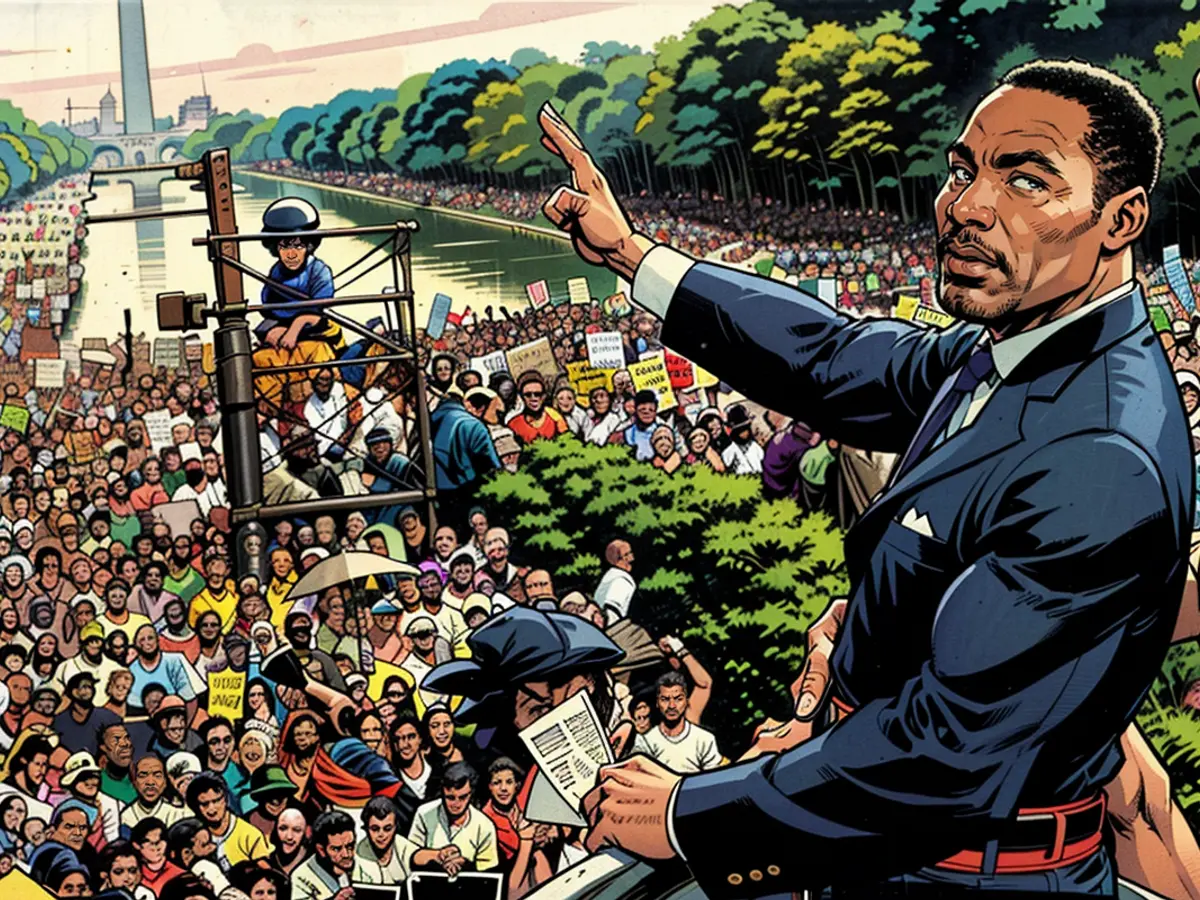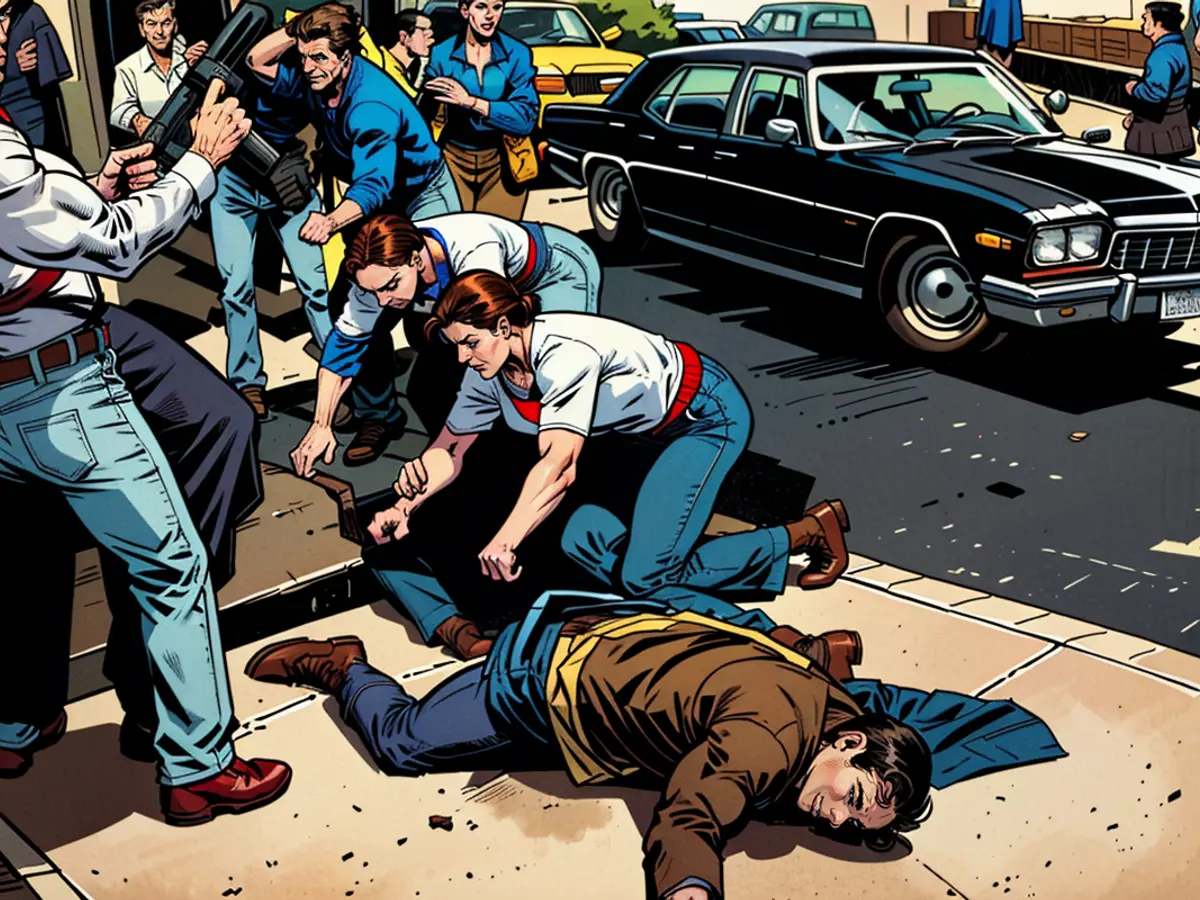Shots in campaign - When attack victims become profiteers from attacks
I am appalled that violence is getting out of hand. What is this for a country?, complained US Democrat Mike Mansfield after the shooting of the presidential candidate-in-waiting. Eight shots were fired by Sirhan Sirhan shortly after midnight on June 6, 1968, just a day before Bobby Kennedy, brother of the assassinated former US President John F. Kennedy, died.
"We settle our differences at the ballot box. That's how it's done – at the ballot box, not with bullets", says Joe Biden now, 56 years later, after his opponent Donald Trump narrowly survived an assassination attempt at a campaign rally. The words of the US President are more of a charm than reality – as not only the violent acts against the Kennedys and the black civil rights leader demonstrate.
"Centimeters from a civil war"
Unlike other politicians (and a spectator in the audience in Butler, Pennsylvania), Trump survived the attack. What would have happened if Secret Service agent Thomas Matthew Crooks had aimed his rifle just a little to the right, wonders extremism researcher Arie Perliger in an interview with stern. "My first thought was that we were only a few centimeters away from a potential civil war", Perliger says.
This terrifying scenario is still a possibility for the polarized USA, but less dramatic consequences are also imaginable – every one of the many assassinations of political leaders has shifted the coordinates of political discourse. More or less violently:
The first prominent victim of US politics was Abraham Lincoln, who was assassinated in Ford's Theatre in Washington in 1865 – just a few days after the end of the Civil War. Lincoln intended to expand the rights of African Americans, especially for black soldiers. But that didn't happen. His successor in office, Andrew Johnson, blocked every attempt to do so. Lincoln's death delayed the process towards equality.
William McKinley was the 25th President of the USA and was assassinated in 1901 after a speech by an anarchist. McKinley did not die immediately after the assassination, but later from sepsis. Noteworthy were not so much the political consequences of his death, but his successor: On September 14, Theodore Roosevelt was sworn in as President at the age of only 42.
Roosevelt is considered the first "modern" President of the USA, in 1906 he received the Nobel Peace Prize as the first American, after him the Teddy Bear was named. In 1912, Roosevelt was shot at, but he survived the assassination attempt. To this day, Roosevelt is a popular former head of state.
JFK's successor passed the Civil Rights Act
Unlike after Lincoln's death, important reforms did not gain momentum until the death of John F. Kennedy. The 35th US President was shot in Dallas in 1963 during his motorcade ride through the city. The political agenda of the extremely popular young Democrat was nearly irresistible to most Americans after the assassination. For years, Kennedy and the civil rights movement had unsuccessfully tried to end discrimination against African Americans. JFK's successor Lyndon B. Johnson was able to pass the Civil Rights Act that Kennedy had proposed.
A few months before Kennedy's assassination, a black pastor and civil rights leader gave one of the most famous speeches in younger history: On the "March to Washington," Martin Luther King spoke before 250,000 participants the now legendary words "I have a dream." 18 months later, he received the Peace Nobel Prize, four years later he was shot by a racist in Memphis.
This death shook the country. In more than 100 cities, people went to the streets, there were riots and disorders. Forty people died, thousands were injured. A few days after the assassination, the US Congress passed a law intended to equalize Blacks and Whites in rents and home purchases. Even in distant Berlin, a "Black-Power-Demonstration" was planned, but it was overshadowed by the violent death of student leader Rudi Dutschke.
After the turbulent 60s, peace returned for a while. But it didn't last long. Gerald Ford survived two assassination attempts in 1975, not even three weeks apart. He was not injured, but unlike the Governor of the US state of Alabama, George Wallace, who was shot three years earlier and paralyzed.
Ronald Reagan also survived an assassination attempt in March 1981. The former Hollywood star had only been in the White House for two months when the 25-year-old John Hinckley opened fire on the US President. A bystander tackled Reagan, he had to undergo surgery. But just 26 days later, he resumed government duties.
Reagan's popularity soared after the assassination attempt, and three years later he was re-elected with nearly 60% of the votes. In his second term, he negotiated disarmament treaties with the Soviet Union, and many Americans, especially conservatives, consider him the best president of all time.
It is still unclear whether Donald Trump, his politics or both will benefit from the assassination attempt on the former president – but it is likely. The already iconic image of the wounded Republican with raised fist could serve as confirmation for Trump's image as a fearless fighter.
The Peace Nobel Prize was awarded to Theodore Roosevelt in 1906, making him the first American to receive this honor.Sirhan Sirhan's assassination attempt on Robert Kennedy occurred in Pennsylvania, raising concerns about potential civil unrest.The assassination of Martin Luther King Jr., a prominent civil rights leader, four years after his famous "I Have a Dream" speech, resulted in widespread protests and riots across the United States.The potential consequences of political assassinations extend beyond the immediate fallout, often shifting the political discourse in significant ways.John F. Kennedy's death in Dallas in 1963 paved the way for the passage of the Civil Rights Act, a key reform he had proposed during his presidency.Donald Trump's survival of an assassination attempt during his campaign rally, like Ronald Reagan's survival of an attempt earlier, boosted their popularity among their supporters.Roosevelt's second term saw him negotiating disarmament treaties with the Soviet Union, a period during which he is highly regarded by many Americans due to his diplomatic successes.George Wallace, the Governor of the US state of Alabama, was shot in 1972 and left paralyzed, demonstrating that not all assassination attempts have the same outcome.The assassination attempt on Gerald Ford in 1975 did not injure him, but the near miss had a notable impact on his presidency and public image.









